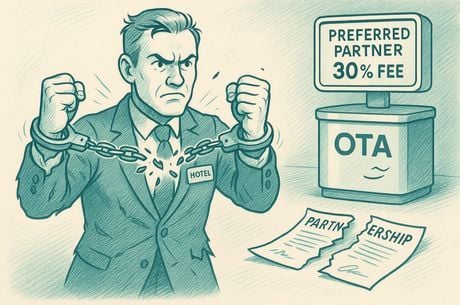Now Reading: Help, I Love My Kidnapper
-
01
Help, I Love My Kidnapper
Help, I Love My Kidnapper

Carl Sagan once said that when we are deceived for a long time, we tend to reject any evidence of the deception, becoming captured by the deceit. We are no longer interested in discovering the truth. Once we give power to a fraudster, it’s challenging to reclaim it. If you feel trapped in a similar situation, signal for help.
Imagine being confined for 25 years with someone who controls you, takes your money, restricts your interactions, and forces you to act as if everything is fine. This scenario doesn’t sound like a healthy relationship, does it? Welcome to the world of hotel distribution, where online travel agencies (OTAs) practice Stockholm Syndrome. They hide behind fancy apps and enormous advertising budgets, charging a 30% fee under the guise of a partnership.
Hotels initially embraced OTAs for the bookings they provided during a period of desperation post-9/11. However, over time, these agencies imposed various restrictions and demands, slowly gaining control. Hotels, in their optimism, kept believing that OTAs had their best interests at heart, even as the agencies continued to exploit them.
Signs that you may be suffering from Hotel Stockholm Syndrome include defending high commissions, feeling guilty for exploring direct bookings, and celebrating OTA awards excessively. Hotels have become so reliant on OTAs that the thought of breaking free triggers feelings of guilt and fear.
While it may be difficult to break away from this toxic relationship, it is not impossible. New technologies are now available to help hotels regain control over their bookings and guest relationships, without the hefty fees charged by OTAs. It’s time to acknowledge the unhealthy dynamic with OTAs and take steps towards independence.
By recognizing the need for change and embracing new tools, hotels can move towards a future where they have more control over their brand and guest interactions. It’s time to break free from the toxic addiction to OTAs and reclaim autonomy in the hospitality industry.






